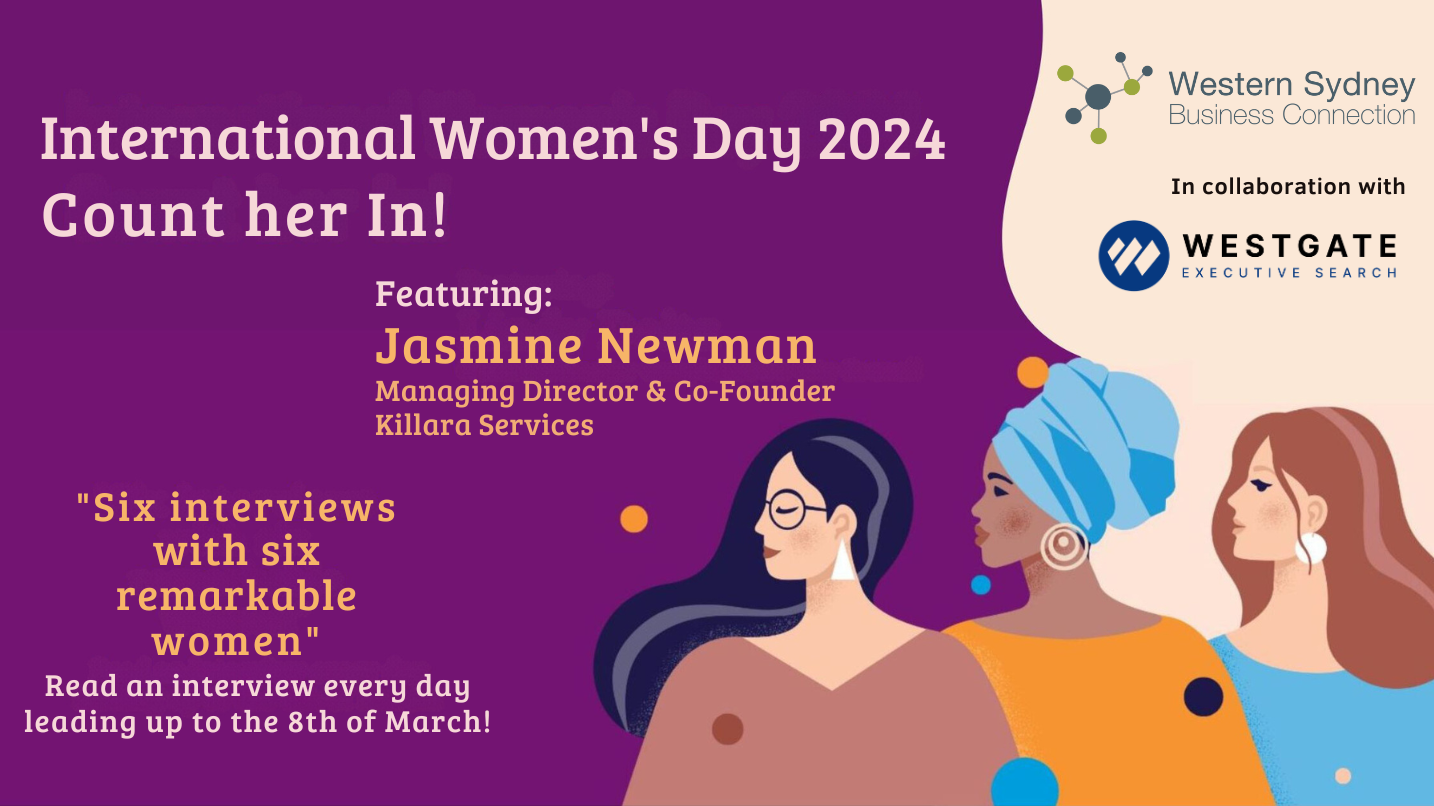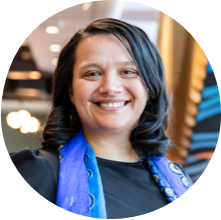UN Women Australia has announced its theme of International Women’s Day 2024 as: Count Her In: Accelerating Gender Equality Through Economic Empowerment. At the Western Sydney Business Connection we wholeheartedly embrace this theme! We present, in collaboration with Westgate Executive Search, a leadership interview series featuring six influential women in our region. With an exclusive article each day leading up to the 8th of March, we celebrate prominent female leaders shaping Western Sydney's business, social and economic landscape. Explore their perspectives, experiences, and commitment to diversity and inclusion.

In our fifth COUNT HER IN Interview, meet Jasmine Newman, Managing Director & Co-Founder of Killara Services. From a mother of four to an Aboriginal business leader, Jasmine's story is one of resilience and community empowerment. Read on and discover how she's breaking barriers, fostering inclusivity, and shaping the future of Indigenous entrepreneurship.
Jasmine Newman
Managing Director & Co-Founder Killara Services

Jasmine Newman is a mother of four children, a wife, and an Aboriginal business woman. Together with her husband she founded Killara Services, the largest Aboriginal owned and operated cleaning company in Australia. She started Killara Services six years ago and now works across the country for a wide range of clients, including the Australian Government, the NSW Government and a large number of corporate organisations. She is a passionate advocate for Aboriginal and Torres Strait Islander people, driven by the legacy of her great-grandfather Bert Groves, an influential Aboriginal activist. She lives by her motto to ‘engage, employ and empower her people’.

Jacqueline Clements: Could you share the story of how you started Killara Services and what you wanted to achieve with your business?
Jasmine Newman: My husband and I started Killara Services six years ago, bringing relevant industry experience with us. We worked together in a cleaning business that we took from a startup to a multi million dollar company. My role in the organisation was ensuring that the business was culturally aligned. However, when it was acquired by a larger company I no longer felt comfortable portraying it as an organisation with an authentic Aboriginal culture. That’s when we decided to start our own business.
Culture is very important to me and it was my inspiration for founding Killara. The urge to make a difference comes from my strong family history of Aboriginal activism. My great grandfather was part of the activism movement in the fifties and sixties here in Sydney. He was responsible for a lot of the work that led to the repeal of the Aborigines Protection Act. He was such a strong advocate for opportunities for our people. With Killara I wanted to pay respect to my pop’s legacy by helping Aboriginal and Torres Strait Islander people into employment. Killara offers soft services, cleaning services for which you don’t need a formal industry qualification. This provides a low entry barrier, making it a really good first job for people who might otherwise not have found employment.
JC: As a woman and an Aboriginal business owner, what challenges and obstacles do you experience in your entrepreneurial journey?
JN: Being a mum and a business owner presents its own set of challenges. The work involved in supporting our staff behind the scenes can be quite demanding. Our people sometimes face very unique challenges, such as being the only person in their family with a job and they need support to hang in there.
Another challenge I faced at the start relates to the male dominated decision making power in the cleaning industry. Winning contracts used to be based on relationships and I don’t think I was taken very seriously when I started. But over the years there has been a significant shift through professionalisation of the procurement space and tenders are now being awarded based on merit. There are also more women with decision making power in the industry. Many of the procurement professionals I work with in corporate organisations and government agencies are women, which is quite refreshing. But we are not there yet. I still walk into environments within corporate Australia where we are the first indigenous business in their supply chain. People sometimes ask incredibly insensitive and inappropriate things. It blows my mind that in 2024 there is still such ignorance around our culture.
JC: What are your views on leadership and how is that different from mainstream ideas of what leadership should look like?
JN: My approach to leadership is definitely different from most leaders I have dealt with throughout my career. My priority is simply being human, a good human. I'm a mom, I'm a wife, and I'm very family oriented. That is the basis for my leadership and I have brought this approach to my business.
Everyone knows my phone is always on and my door is always open. That applies to my family, to my management team, to the staff in the office and the cleaners on the ground. I make an effort to solve problems, even if these are not related to turning up at work and getting the cleaning done. That is not always easy. I have supported people with domestic violence plans, helped with the paperwork and removed them from dangerous situations. I have organised emergency accommodation for staff, I shopped and put groceries in their fridge and picked people up from their homes and drove them to work.
These are all responsibilities that are not normally part of the role of a managing director. And the costs for this support are not business expenses, they come out of my personal finances. So my approach to leadership is to treat everyone like family and this is something that you can not do in a mainstream business.
Another foundation of my leadership is that I want to create safe spaces. Most of our staff are women who choose to work for us because of the level of cultural safety we offer. We provide cultural awareness training in the organisations of our clients to create an understanding of what cultural safety means. This way we can ensure that these places are fit for our women to work in.
At the same time I want to do right by our customers too. I place a lot of emphasis on customer service. We teach our staff that it doesn't matter whether you work in a corporate building or a high security building, you always say good morning, you can always be nice.
JC: You are very passionate about Killara Services and have worked hard to achieve success. How are you going to take this to the next level?
JN: That is a very good question. The biggest challenge we faced during the past 12 months is that we have grown so much that we are no longer competing in the indigenous business sector. We are now competing against large corporate organisations with hundreds of millions in revenue and decades of experience. The implication is, that even when everybody wants to feel amazing about engaging with an indigenous business, it is hard to win a tender in such a competitive environment.
I anticipated this and invested heavily in my business development team early on. We are lucky to have one of the best business estimators in the country work for us. But it is not the commercial aspect that is the challenge, it is the perception that there is an element of risk in dealing with an Aboriginal business. And we also see many organisations just being comfortable with the businesses they have long time relations with, which creates barriers for newcomers like us. But I strongly believe that there is no issue in delivering the jobs we commit to. We are more than capable.
What I and other women in the Aboriginal business sector have observed is that there is so much support for indigenous business to start, but a real void in helping them grow. I want to change that with a new service. I’m going to call it Mimi, which is an Aboriginal word for sister. It will be a consortium of female owned businesses, where Aboriginal women can come together to support each other in the growth of their businesses. And I would like to have a panel of experienced indigenous business leaders who can offer one-on-one support. We have plenty of people in our networks who have the ability to make introductions and open doors for indigenous women into relevant supply chains. I believe that this is something that can really make a difference.
Learn more about Killara Services: killaraservices.com.au
Presented in collaboration with:

By Jacqueline Clements
CEO, Westgate Executive Search